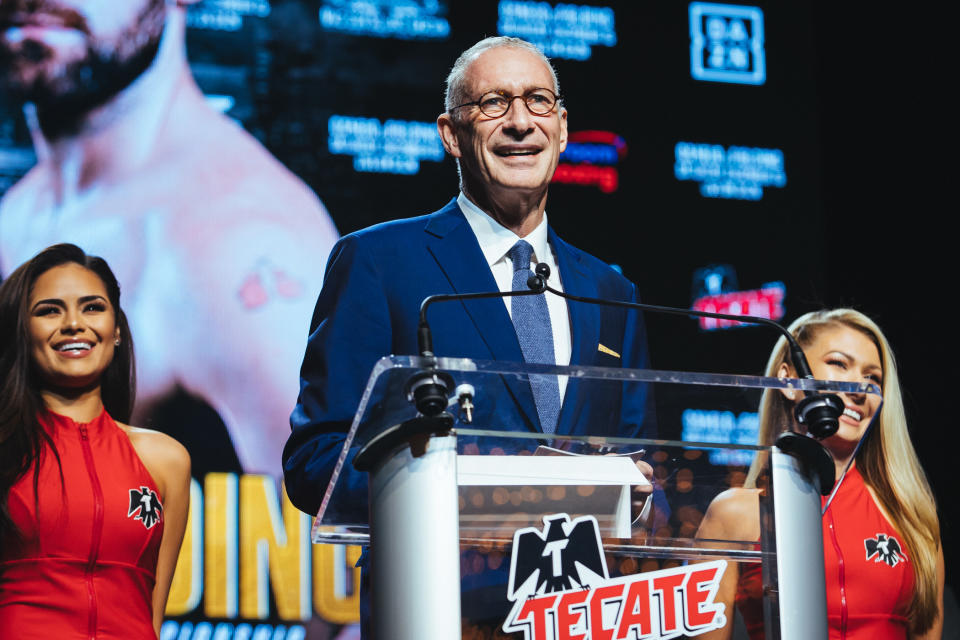Ex-ESPN President John Skipper: Why DAZN can compete with ESPN
DAZN, the UK-based “Netflix of sports,” is spending big on boxing to get a foothold in America. The subscription service announced on Wednesday a massive $365 million deal with Oscar De La Hoya’s Golden Boy Promotions to stream boxer Canelo Alvarez’s next 11 fights. The action starts on Dec. 15 when Alvarez fights Rocky Fielding at Madison Square Garden for the WBA Super Middleweight title.
Add the Golden Boy fights to a $1 billion deal DAZN made in May with Eddie Hearn’s Matchroom Boxing for 32 fights and a 22-fight deal DAZN (pronounced “da zone”) made with MMA promoter Bellator, and you see the strategy for DAZN’s entry in America: combat sports.
Why combat sports?
“I think you start with the fact that boxing is already a sport that is a direct-to-consumer transaction,” says John Skipper, the former ESPN president who is now DAZN’s executive chairman. “At the highest level of boxing, people pay money to watch a fight. We are in the consumer business. We want a direct contract with consumers to watch sports, so it makes sense to start with a sport where people already do that.”

Skipper knows a thing or two about buying sports broadcasting rights, though growing DAZN from the ground up is a very different proposition from running the “worldwide leader in sports.” That start-up position is And indeed, he says that is DAZN’s advantage in competing with incumbents like ESPN, which has seen some success with its new ESPN+ streaming service.
“I loved being at ESPN,” Skipper tells Yahoo Finance. “They are the preeminent sports media company in this country, and what they are doing is protecting their flank and trying to transition into a new world. So I have nothing but admiration for what they’re doing. On the other hand, I will tell you that it is really fun to be in a position where you are not trying to navigate a transition, where you can jump right into the future. The future of sports is going to be on streaming services, and that is all we [at DAZN] have to worry about. I don’t have to worry about buying fights and then which one goes on cable and which one goes on my subscription service. We are a pure play. And we are buying content to put into a subscription service.”
In other words, DAZN has an advantage over ESPN because it has no linear television channel to worry about. Or at least, that’s Skipper’s argument. DAZN, right now, has zero name-brand awareness in America. It’s starting from scratch.
But having the best fights could help fix that right away.
“People are not going to subscribe to 40 different streaming services,” Skipper acknowledges. “But it is sports that drove the adoption of pay television. It is a business which is declining in penetration, so as it declines in penetration, there will be people who have the opportunity to grow—like Netflix, like the new Disney package. And we believe sports is one of the things people have to have. There are very few have-to-have things. And there are content companies that don’t have must-have content. Canelo Alvarez’s fights are must-have content.”
Soon enough, boxing fans will prove whether they agree.
Skipper also gives the caveat that DAZN is already established in certain markets. “We’re a global business. We’re building a business in Japan based on baseball, we’re building a business in Italy with Serie A [soccer], we’re building a business in Canada based on the NFL,” he says. “Fighting is the entry point for our service in the U.S., but we fully intend to supplement fighting with other sports.”
What’s clear right now is that DAZN is willing to spend massively on content rights to lure subscribers. The parent company of DAZN is London-based Perform Group, which also owns a group of sports media sites including Goal.com and Sporting News. Last month, Perform Group quietly changed its corporate name to DAZN Group, which should make abundantly clear exactly where the focus at the company now lies.
—
Daniel Roberts is the sports business writer at Yahoo Finance and hosts the Sportsbook podcast. Follow him on Twitter at @readDanwrite.
Read more:
DAZN is launching in America in September with boxing, MMA
Perform Group spends $1 billion to stream boxing in America on DAZN
Sports media VC George Pyne: ‘There’s going to be a Rupert Murdoch of digital’
ESPN’s new streaming service is aimed at a very specific sports fan

